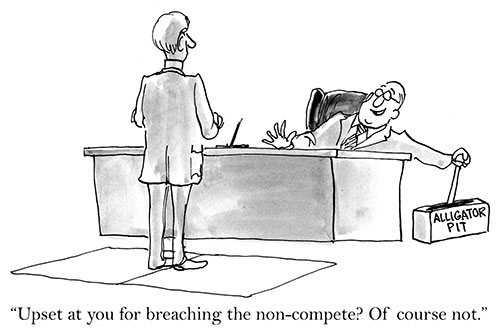Are Non-Competes Legal in Arizona?
In the business world, non-compete clauses have become increasingly common. A non-compete agreement is a contract designed to prevent employees from entering into business activity that directly competes with their former employer after finding new employment.
Ordinarily, employees are barred from entering into certain business activities for a specified period of time.
Arizona residents and employees ought to be aware of these agreements and whether they are legally enforceable in Arizona.
The Legality of Non-Competes in Arizona
Determining whether a non-compete agreement is enforceable in Arizona ultimately depends on the scope of the agreement.
Broadly speaking, if the scope of the agreement is narrow in scope and protects only the employer's legitimate business interests, it is extremely likely that the order will be enforceable.
Alternatively, if the non-compete is too broad and unreasonable — in other words, the agreement goes far beyond protecting the employer's legitimate business interests — the agreement may not be enforceable.
More precisely, Arizona law requires courts to look at two key factors when determining the legality of a non-compete agreement.
Non-Competes Legal in Arizona
Factors That Lead a Court to Enforcing a Non-Compete
Arizona courts will enforce a non-compete agreement if:
The agreement protects a legitimate business interest
The non-compete is reasonable in both its scope and duration
The agreement does not violate Arizona public policy in any way
Regarding legitimate business interests, there are a number of legitimate interests that may justify a non-compete agreement.
Trade secrets, patents, intellectual property and similar interests are going to be legitimate enough to justify a non-compete agreement. For this reason, unsurprisingly, non-compete clauses are common in the tech industry and the sales industry alike.
Second, when courts look into whether the agreement is reasonable in scope and duration, understand that this analysis will vary by industry.
What is reasonable in the tech sector may vary from what is reasonable in the restaurant industry, for example.
Geographic restrictions and time duration will also need to be looked at based on what is the reasonable industry norm.
No matter the industry, however, an employer must be capable of producing evidence that the scope and duration is needed for business reasons.
Third, Arizona courts care a great deal about whether a non-compete agreement violates public policy in some way, shape or form.
As the term "public policy" implies, a non-compete agreement that harms the Arizona public in some meaningful way will not be legally enforceable.
An example of this would be a non-compete agreement that deprives the employee from working in their field at all, which naturally goes against Arizona's public policy to ensure all its residents are capable of pursuing and obtaining meaningful employment.
What Happens If an Arizona Court Takes Issue With Non-Compete Clauses and/or Provisions?
If a court finds that certain provisions of a non-compete are unreasonable, do not protect legitimate business interests or violate public policy, they can eliminate any and all provisions of the agreement.
This is not to say that the entire non-compete will be legally invalid, however.
The court can simply eliminate the provisions that are legally problematic, and the provisions that are reasonable can remain as originally agreed.
In short, non-competes are generally going to be legally enforceable, even if there are certain provisions that will be removed from the agreement.
If you have any questions about non-compete agreements or take issue with a specific provision of a non-compete, discuss the matter with an Arizona employment lawyer.
Contact Tyler Allen Law Firm, PLLC for a legal consultation to discuss your non-compete questions and concerns with an Arizona employment lawyer.

